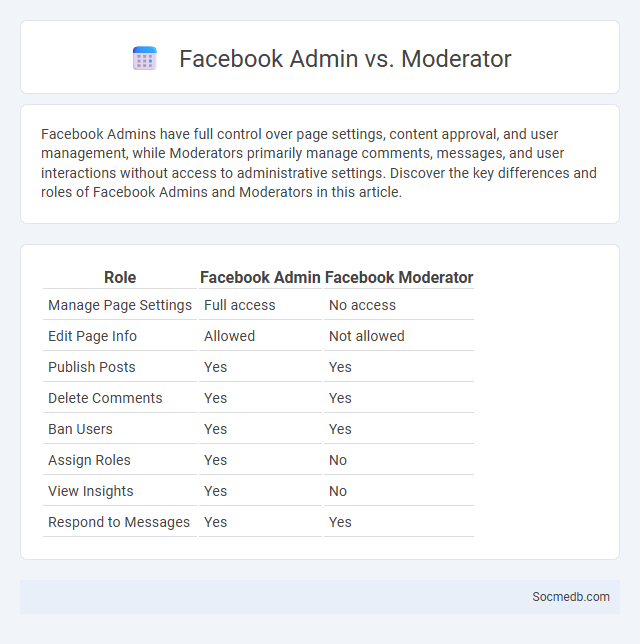
Photo illustration: Facebook Admin vs Moderator
Facebook Admins have full control over page settings, content approval, and user management, while Moderators primarily manage comments, messages, and user interactions without access to administrative settings. Discover the key differences and roles of Facebook Admins and Moderators in this article.
Table of Comparison
| Role | Facebook Admin | Facebook Moderator |
|---|---|---|
| Manage Page Settings | Full access | No access |
| Edit Page Info | Allowed | Not allowed |
| Publish Posts | Yes | Yes |
| Delete Comments | Yes | Yes |
| Ban Users | Yes | Yes |
| Assign Roles | Yes | No |
| View Insights | Yes | No |
| Respond to Messages | Yes | Yes |
Understanding Facebook Roles: Admin vs Moderator
Understanding Facebook roles is crucial for managing your group effectively, with Admins holding the highest level of control, including setting group rules, approving members, and managing posts. Moderators assist by enforcing guidelines, moderating discussions, and removing inappropriate content without access to all admin settings. Knowing the differences between Admin and Moderator roles helps you delegate responsibilities and maintain a positive community environment.
Key Responsibilities of a Facebook Admin
A Facebook Admin manages page content by creating, scheduling, and publishing posts to maintain engagement and brand consistency. They monitor comments and messages, responding promptly to foster community interaction and resolve customer inquiries. The role includes analyzing page insights to track performance metrics and optimize content strategies for enhanced reach and user engagement.
Primary Duties of a Facebook Moderator
Facebook moderators are responsible for monitoring user-generated content to ensure compliance with community standards and platform policies, promptly removing inappropriate posts such as hate speech, misinformation, or graphic violence. They engage with users by addressing concerns or disputes, fostering a respectful and safe online environment. Your role also includes flagging potential security threats and reporting policy violations to maintain the integrity of the social media platform.
Privileges Exclusive to Facebook Admins
Facebook admins enjoy exclusive privileges such as managing page roles, moderating content, and accessing advanced analytics. They can customize user permissions, control post publishing schedules, and remove inappropriate comments to maintain community standards. These capabilities empower admins to optimize engagement and ensure a safe, well-organized social media environment.
Moderator Capabilities Compared to Admins
Social media moderators specialize in enforcing community guidelines by reviewing content and managing user interactions to ensure a safe and respectful environment, while admins possess broader control including platform configuration, user permissions, and strategic decision-making. Moderators typically handle day-to-day content moderation tasks such as flagging inappropriate posts and resolving disputes, whereas admins oversee overall community settings and can implement policy changes or ban users permanently. The distinction allows efficient management by separating routine enforcement duties from high-level administrative responsibilities.
Assigning and Managing Roles on Facebook Groups
Assigning and managing roles in Facebook Groups streamlines administration by designating specific permissions to members, such as Admin, Moderator, and Member roles. Each role carries distinct capabilities, enabling Admins to control content moderation, member management, and group settings effectively. Proper role management fosters organized community engagement and ensures the group operates smoothly with clear responsibilities.
Limitations of Facebook Moderators
Facebook moderators face significant challenges due to the platform's vast volume of content, making real-time review difficult. Ambiguities in cultural context and language nuances often lead to inconsistent moderation outcomes. The psychological toll on moderators is substantial, resulting from continuous exposure to graphic and harmful material.
Best Practices for Admins and Moderators Collaboration
Effective collaboration between admins and moderators on social media requires establishing clear roles and consistent communication channels to ensure timely content review and policy enforcement. Utilizing shared tools like moderation dashboards and chat platforms enhances coordination, enabling quick response to community issues and spam prevention. Regular training sessions on platform guidelines and evolving community standards empower teams to maintain engagement and uphold community trust.
Choosing Between Admin and Moderator for Your Group
Selecting the right role between admin and moderator is crucial for managing your social media group effectively. Admins hold comprehensive control, including settings and membership management, while moderators primarily focus on content moderation and enforcing group rules. Understanding the specific responsibilities and your group's needs ensures optimal engagement and community safety.
Role Changes: Upgrading or Downgrading Permissions
Social media platforms frequently update user roles to enhance security and streamline management, allowing you to upgrade or downgrade permissions based on activity and trust levels. Adjusting roles ensures that users with administrative access have appropriate rights, reducing risks associated with unauthorized content posting or data access. Regularly reviewing and modifying permissions helps maintain compliance with platform policies and protects your social media presence from potential security breaches.
 socmedb.com
socmedb.com